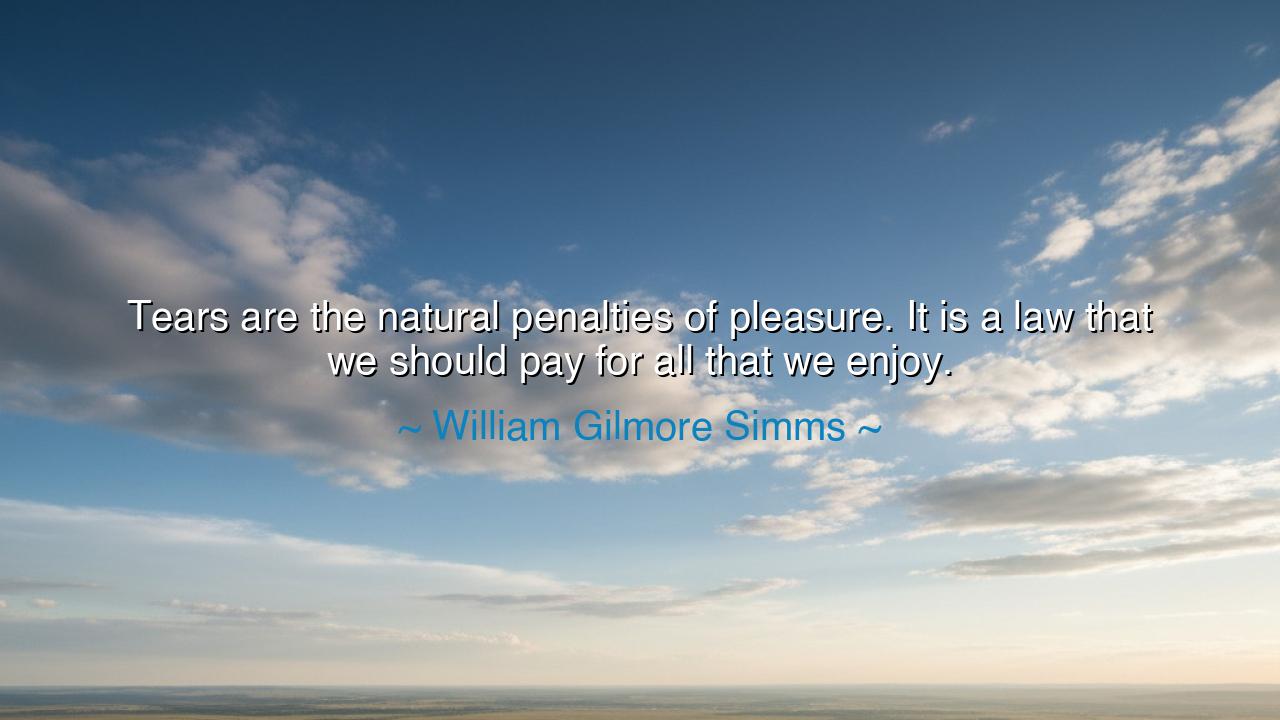
Tears are the natural penalties of pleasure. It is a law that we
Tears are the natural penalties of pleasure. It is a law that we should pay for all that we enjoy.






“Tears are the natural penalties of pleasure. It is a law that we should pay for all that we enjoy.” — so spoke William Gilmore Simms, a poet of the old South, who knew the rise and fall of joy, and how swiftly the hand of sorrow follows the heart’s delight. His words remind us that pleasure and pain are twin children born of the same womb; that the sweetness of life is forever bound to its bitterness. To live fully is to taste both, for nature, in her perfect balance, allows no delight that does not carry with it the shadow of loss.
From the beginning of time, the wise have known this truth. The ancients called it the balance of the spheres, the unbreakable harmony that governs all existence. The sun rises, but must set; spring blossoms, but yields to the fall. So too with man’s heart — when he laughs too freely, he prepares the way for tears. This is not cruelty, but justice, a cosmic law older than the stars. For if joy were endless, it would lose its value; if the harvest came without labor, the grain would turn to dust in our hands.
Consider the tale of King Croesus of Lydia, who once believed himself the happiest of men. His wealth glittered like the sea at dawn, his power reached across the world, and his name was spoken with awe. Yet when he asked the sage Solon who was happiest, Solon named not him, but a humble man who died in peace after a life of service. Croesus laughed then — but his laughter turned to tears when fortune betrayed him, his kingdom fell, and he was bound upon the pyre. Only then did he understand the law: that every pleasure has its price, and every joy is a fleeting guest in the house of life.
Even in the smallest things, this truth holds fast. The mother who rejoices at her child’s first cry must one day weep when he leaves her side. The warrior who tastes victory also carries the weight of the fallen. The lover who knows the ecstasy of passion will one day know the sorrow of parting. It is not the gods who punish us — it is life itself reminding us that nothing pure and beautiful comes without cost. Our tears are not a curse but a tribute, the offering we make for having dared to feel deeply.
Yet there is a nobility in this law, for it teaches us to live with courage. Should we, fearing pain, refuse the joy that summons it? Should we deny the laughter because it may end in mourning? No — for then we would live as stones, untouched by the music of the world. It is better to love and lose, better to strive and fail, better to dance even if the night must end. The soul grows only through the full circle of pleasure and sorrow, for the one without the other is an empty echo.
The lesson, then, is not to flee from pleasure, but to honor its price. When joy visits you, welcome it like a noble guest; when grief follows, greet it as an old friend. Know that both are the servants of wisdom. Let your heart be soft enough to feel, yet strong enough to endure. The man who can smile through his tears, who can cherish the rose even as it fades — he alone understands the secret harmony of existence.
So, my child, when life brings you delight, do not cling to it too tightly, nor shrink from it in fear. Take your pleasure with gratitude, and when the time comes to pay its penalty, offer your tears freely and without shame. For those tears are not signs of weakness, but the golden proof that you have truly lived. Let them fall as blessings upon the soil of your heart, from which, in time, new joys will bloom again.






AAdministratorAdministrator
Welcome, honored guests. Please leave a comment, we will respond soon